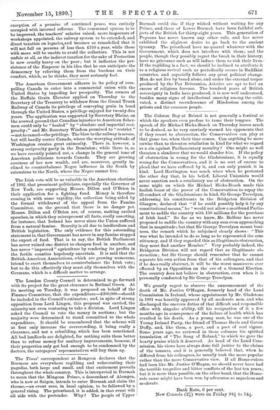The Times' correspondent at Rangoon declares that the Burmese are
everywhere regilding and redecorating their pagodas, both large and small, and that excitement prevails throughout the whole country. This is interpreted in Burmah to mean that the Mingoon Prince, a descendant of Alompra, who is now at Saigon, intends to enter Burmah and claim the throne,—an event sure, in local opinion, to be followed by a general rising. The priesthood, it is added, in that event will all side with the pretender. Why P The people of Upper Burmah could rise if they wished without waiting for any Prince, and those of Lower Burmah have been faithful sub- jects of the British for thirty-eight years. This generation of Peguans has never known any other rule, and has never exhibited the slightest desire to go back to the ancient tyranny. The priesthood have no quarrel whatever with the Government, which does not interfere with them; and the people, though they possibly regret the break in their history, have no grievance such as will induce them to risk their lives. If the regilding is a fact, we should be inclined to attribute it to a religious revival such as periodically occurs in Buddhist countries, and especially follows any great political change. Men do not live by bread alone, and under the external torpor produced by the Pax Britannica, Asiatics are apt to feel an excess of religious fervour. The hundred years of British sovereignty in India have produced, it is now well understood, besides many signs of intellectual anarchy among the culti- vated, a distinct recrudescence of Hindooism among the priests and the common people.


















































 Previous page
Previous page